Executive Summary
The Health Savings Account (HSA) is unique in the landscape of tax-preferenced investment acounts, as it is the only type that enjoys both the benefit of tax-deductible contributions and tax-free distributions (for medical expenses). In fact, the unique treatment of the HSA has created a wrinkle in the traditional approach of funding retirement accounts: given the inevitability of medical expenses in retirement, arguably the best savings account for retirement (or at least for a portion of retirement expenses) is to use a health savings account for retirement over “just” an IRA alone.
In other words, for any retiree that is saving for both medical expenses in retirement and also all of their other retirement goals, using a combination of an IRA (for most retirement expenses) supplemented by an HSA as a "retirement health savings account" may be the most tax-preferenced way to save holistically for retirement. In fact, the health savings account tax treatment is so good that it can even be superior to funding a 401(k) plan with a small match (for those who haven't already started a health savings account for retirement)!
Notably, this doesn’t mean that retirees would exclusively fund a health savings account for retirement, as the accounts are both taxable and potentially subject to penalties if used for non-medical purposes. But for those who already have some retirement accounts, and/or have more than enough dollars overall to achieve their goals, the fact remains that contributing the maximum to an HSA every year has the potential for more beneficial tax treatment than any other type of tax-preferenced account! Which makes accumulating in an HSA so desirable that it may even be preferable to pay current medical expenses out of pocket, just to preserve (and keep contributing to) the HSA account balance to be used as a future health retirement account!
Health Savings Account Rules
The Health Savings Account (HSA) was created as a part of the Medicare Prescription Drug, Improvement, and Modernization Act of 2003 (also known as the Medicare Modernization Act).
The basic concept of the HSA is that it is a savings account to be used for health/medical expenses, with preferential tax treatment. Contributions to the Health Savings Account are pre-tax (either tax deductible if contributed directly, or excluded from income if contributed by an employer on behalf of an employee). Withdrawals from an HSA for qualified medical expenses are tax free (although non-qualified withdrawals are taxable as ordinary income plus a 20% penalty tax, with the penalty waived for those over age 65, or who are disabled, or if withdrawn as a non-spouse beneficiary after the death of the HSA owner).
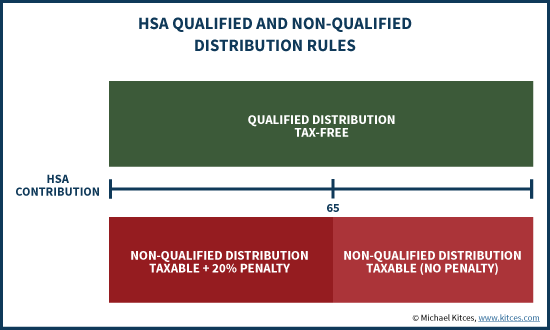
Qualified medical expenses are generally any expenses that would otherwise be eligible for the medical (and dental) expenses deduction, along with any expenses paid for a doctor-prescribed drug. Qualified medical expenses also include insurance premiums for health insurance coverage under COBRA, health care coverage while receiving unemployment compensation, Medicare (but not Medigap) premiums, and even long-term care insurance (but only up to the age-based LTC premium limits).
In order to be eligible to participate in (i.e., to contribute to) a Health Savings Account, you must be covered under a High-Deductible Health Plan (HDHP), and not be enrolled in Medicare or other health coverage, nor claimed as a dependent on someone else’s tax return. A “high deductible” health plan must have a minimum deductible of $1,300 for self-only coverage or $2,600 for family coverage (in 2016), and can have a deductible as high as $6,550 for an individual or $13,100 for a family (in 2016).
Notably, while Health Savings Accounts were intended to help cover medical expenses associated with high-deductible health plans, the contribution limits to an HSA are set lower than the (maximum) limits on deductibles (though a health insurance plan may have a lower deductible to conform to the HSA limits). In 2016, the maximum contribution limit to an HSA is (only) $3,350 for an individual, or $6,750 for a family, plus a $1,000 “catch-up” contribution for those over age 55 (unlike retirement accounts, where catch-up contributions apply beginning at age 50).
What Happens If You Don’t Use Your HSA Right Away? Not A Use-It-Or-Lose-It Account!
Ultimately, the Health Savings Account is unique from the tax perspective, as it is one of the only accounts that permits both a tax deduction up front for contributions and can produce tax-free distributions for growth later – unlike retirement accounts, which may be pre-tax up front but taxable later (e.g., a traditional IRA or 401(k)), or are tax-free later but receive no tax deduction up front (e.g., a Roth IRA or 401(k)).
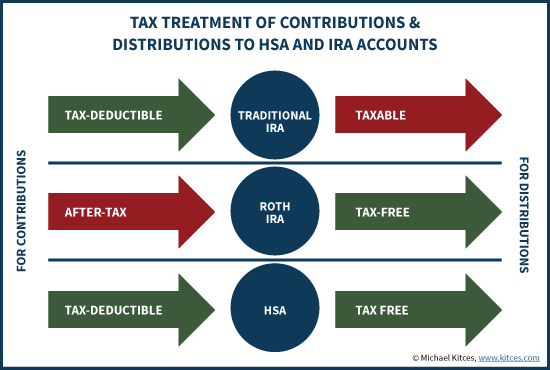
And despite this uniquely generous tax treatment for an HSA, there is actually no time limit on when funds in an HSA must be used. An HSA does not have a “use it or lose it” provision like the Flexible Spending Account (FSA) where anything more than $500 of unused funds are forfeited at the end of the year. Instead, as long as they were permitted to be contributed into the HSA in the first place (i.e., the HSA owner was covered under an HDHP at the time), HSA funds can remain in the account for an extended period of time (growing on a tax-deferred basis) and be used (tax-free) later.
In turn, the only requirement at the time of distribution for tax-free treatment from an HSA is that the withdrawal either cover a current medical expense, or be used to reimburse a prior one (that was itself paid out of pocket, was not reimbursed from another source, and was not previously claimed as an itemized deduction). This means that medical expenses can occur now and be reimbursed later (even far later) in the future and still be qualified, as long as documentation of the medical expense is maintained and as long as the medical expense occurred after the HSA was originally established. Alternatively, this means that funds can be contributed now to an HSA, and grow tax-free for years or even decades, before being used (tax-free including all those years of growth) for a distant future medical expense.
Even further extending the favorable deferral period for an HSA, the rules stipulate that if the HSA is not used before death, a surviving spouse can continue the HSA in his/her own name and continue the preferential tax treatment (including future tax-free withdrawals). This form of HSA spousal rollover is similar to that permitted for retirement accounts.
A Supplemental Retirement Vehicle - The Retirement Health Savings Account (HSA)
What Can You Use Your Health Savings Account For?
The classic view of an HSA is that it’s an account to hold the money that someone sets aside to cover the deductible for their health insurance. Funds are contributed to the account on a pre-tax basis, and to the extent they’re subsequently used (typically that year) to cover the unreimbursed expenses associated with the health plan’s deductible, the end result is that health expenses are paid on a pre-tax basis (with the HSA as the ‘conduit’ to make that happen). This is often a better tax treatment than paying health care expenses directly from a checking account, where payments are just "normal" medical expenses with a deduction limited to 10% of Adjusted Gross Income (AGI) for those under age 65... which means most or all medical expenses paid out of pocket don’t actually produce a tax benefit.
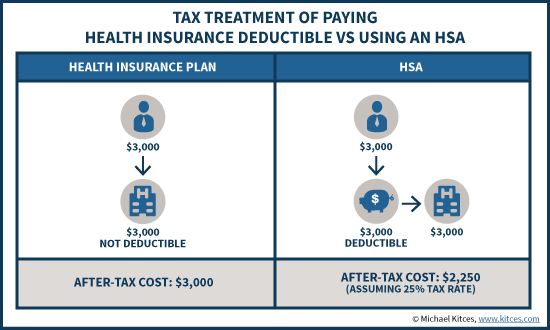
In addition, to the extent that not all the funds for the HSA are actually used on medical expenses for the current year – for instance, the account owner didn’t actually incur enough medical expenses to use the funds in the first place – the remaining account balance simply “carries over” to be used in a subsequent year.
Other Health Savings Account Uses
Because there’s no requirement that HSA funds be used to cover medical expenses in the current year – the HSA can be used in the future – an alternative opportunity emerges: to contribute funds to an HSA, and deliberately not use them as medical expenses are incurred. Instead, medical expenses are paid out of pocket – in addition to the HSA contribution – and the HSA funds are allowed to accrue (tax-free) for future use instead.
Of course, the caveat to this approach is that it’s only helpful if the funds really can be used in the future on a tax-free basis. If it turns out they have to be withdrawn as a non-qualified distribution, the inhospitable taxes plus 20% penalty will apply. Yet the reality is that for a future retiree, the odds are overwhelming that some medical expenses really will be applicable in retirement. In fact, “typical” retiree expenses on health care are often as much as $500/month (or $1,000/month for a married couple), much of which covers HSA-eligible qualified medical expenses like Medicare premiums and out-of-pocket medical costs (although Medigap coverage doesn’t count). Cumulatively, Fidelity’s annual “Health Care Cost Estimate” study for retirees estimates that a 65-year-old couple will need a whopping $245,000 to cover health care expenses in retirement.
In other words, if we think of expenses in retirement as including both medical and “other” retirement expenses (where “other” includes housing, entertainment, food, lifestyle, and everything else that isn’t medical), then an HSA can be used to save for the medical portion of retirement expenses, and retirement accounts can be used for all other retirement expenses. In fact, with the virtual certainty of ongoing Medicare premiums along, contributing to an HSA now is effectively a form of Medicare Health Savings Account, allowing tax-free growth for future Medicare expenses. Which ultimately is a better strategy than “just” using retirement accounts for retirement, given that the HSA has better tax treatment (pre-tax going in and tax-free coming out) than any type of retirement account (which only gets the tax-deduction up front or tax-free distributions, but not both).
Paying Medical Expenses Out Of Pocket To Defer HSA Distributions For Medicare Premiums
Given that eligibility to contribute to an HSA starts with being a participant in a high-deductible health plan – which means if a health event happens, there will be significant out-of-pocket medical expenses to cover – the strategy of using an HSA as an accumulation vehicle to supplement retirement effectively means having a high-deductible health plan, funding the HSA, and then not using the HSA for the inevitable health care expenses that occur.
This can place a non-trivial cash flow burden on the household, as it means it’s necessary to have far more cash on hand – enough to cover the pre-tax contribution to the HSA (as much as $3,350 for an individual and $6,750 for the family), plus the health plan’s actual deductible (which could be as high as $6,550 for an individual and $13,100 for a family! And as noted earlier, most of that health insurance deductible will not likely be tax deductible, either. In other words, the household’s cash flow commitment to health care expenses may be increased by upwards of 50% over what might have been set aside for “just” the health insurance deductible alone.
Nonetheless, to the extent that a household really does have more-than-enough to cover the health insurance deductible, the reality is those excess funds were going to be saved somewhere anyway. So the real question is whether to contribute to the HSA and use it for medical expenses (and then save the rest elsewhere), or to contribute to the HSA and use other funds for medical expenses instead. With the potential that by contributing to the HSA and using other funds for medical expenses, the HSA can grow (tax-free) until retirement and then be used to cover Medicare premiums and other retiree health care expenses.
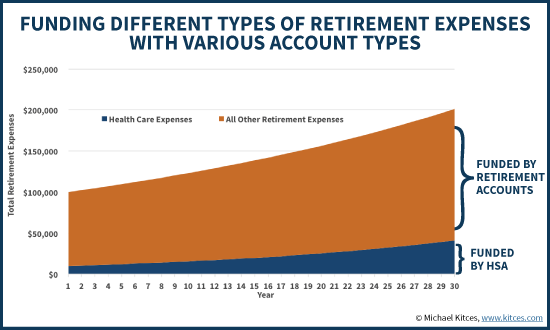
Paying Non-Deductible Medical Expenses Out Of Pocket While Growing A Health Savings Account For Retirement
Imagine an individual who has $10,000 of pre-tax funds available, is in a 25% tax bracket, and has a health insurance plan with a $3,000 deductible.
Option #1 might be to contribute $3,000 to a health savings account (subsequently paid out to cover the health insurance deductible). This leaves $7,000 of pre-tax income (after the HSA income), of which $1,750 (which is 25%) will go to taxes and the remaining $5,250 will be contributed to a Roth IRA. The end result is that the medical expenses have been covered (pre-tax) and the individual finishes with a $5,250 Roth IRA.
Option #2 instead is to contribute $3,000 to a health savings account (on a pre-tax basis), and then cover the $3,000 of anticipated medical expenses out of pocket. Since the health care expenses won’t likely be deductible, it will really require $4,000 of pre-tax income to have $3,000 left over. With the remaining $3,000 of pre-tax income, the individual can again pay the 25% tax rate, have $2,250 left over, and contribute that $2,250 to a Roth IRA. The end result is $3,000 in an HSA and $2,250 in a Roth IRA.
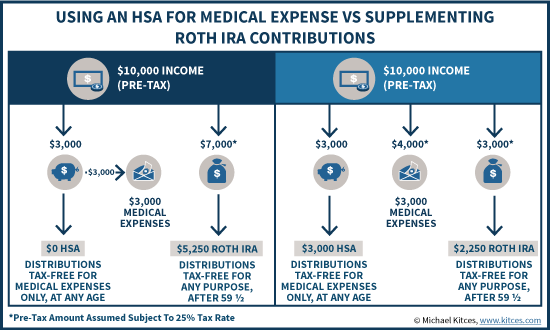
Notably, the outcome of this scenario is that when medical expenses paid out of pocket will not be deductible, the individual ends out with the same amount of total dollars in tax-preferenced accounts. It’s either $5,250 in a Roth, or $5,250 split between a Roth and an HSA. Arguably, in this scenario the HSA is not necessarily materially better, nor is it materially worse. Both accounts will be eligible for tax-free distributions for their respective purposes in retirement. The only difference is that distributions from the Roth IRA cannot be tax-free under age 59 ½, while earlier distributions from the HSA could be tax-free for medical needs (in exchange for the fact that over 59 ½ they’re still only for medical expenses).
Deductible Medical Expenses Above The AGI Limits And An HSA Contribution
For those whose medical expenses actually will be deductible – perhaps because income is low and the threshold can be reached, or because there are other medical expenses (e.g., for other family members) that together will add up to exceed the 10%-of-AGI threshold, the situation is different.
Continuing the prior example, now the individual contributes $3,000 to a health savings account, and “only” needs $3,000 of pre-tax income to cover actual medical expenses (since they are assumed to be deductible), and thus has $4,000 of pre-tax income left over, yielding $3,000 as a Roth IRA contribution after 25% (or $1,000) is held aside for taxes. The end result – in this case, there’s $3,000 in the HSA and also $3,000 in a Roth IRA.
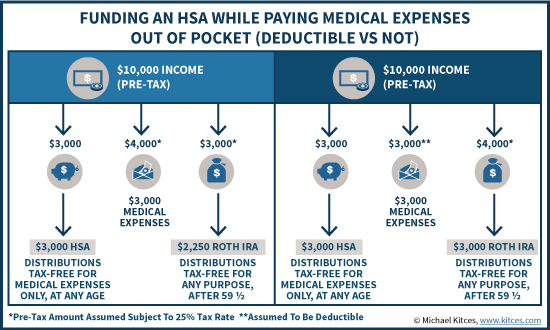
In other words, to the extent that medical expenses actually will be deductible anyway, the tax savings on medical expenses frees up additional dollars to contribute to the Roth IRA. In essence, it’s a double tax deduction opportunity – for the medical expenses now, and for the HSA to fund medical expenses in the future, and the HSA grows tax-free in the meantime.
Again, this assumes the individual has enough free cash flow in order to fund all of these simultaneously – the HSA, the medical expenses out of pocket, and the Roth IRA. Nonetheless, to the extent there are dollars for all three, whenever the medical expenses are at least partially deductible, more dollars can be placed into tax-preferenced accounts.
HSA Contributions For Those Who Maxxed Out Retirement Accounts
In the scenario where retirement accounts have been fully “maxxed out” already (e.g., 401(k) plans, a pre-tax IRA or a backdoor Roth IRA, etc., have already been done), contributions to an HSA become even more appealing. Because in this situation, the “excess” dollars that don’t go towards medical expenses will simply end out in a taxable brokerage account, which is clearly less favorable than having dollars in a tax-preferenced health savings account for retirement.
For example, imagine again a scenario with $10,000 of pre-tax income to allocate, where retirement accounts are not an option because the contribution limits have already been reached. The first option, again, is to contribute $3,000 to the HSA and use those funds for the actual health insurance deductible; the remaining $7,000 of pre-tax income turns into $5,250 of after-tax dollars, which end up in a taxable investment account. On the other hand, if the HSA contribution is preserved in the account and the medical expenses are paid out of pocket, the investor finishes with $3,000 in the HSA and $2,250 in the taxable investment account. While the latter scenario still has a total of $5,250 in investment dollars, the difference is that now $3,000 of those funds will grow tax-free for the future!
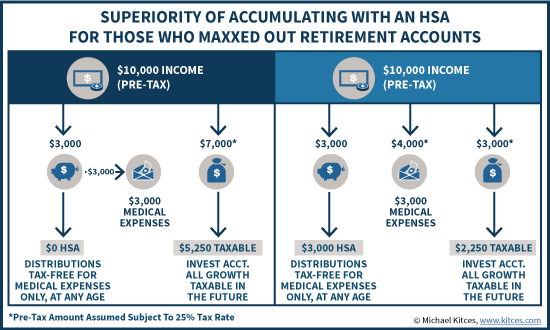
When A Retirement Health Savings Account Can Beat A Traditional Retirement Account (Even With A 401(k) Match)
Notably, all of the earlier scenarios have assumed that the individual in question will have medical expenses to pay for in the current year (such that it's necessary to fund an HSA contribution and pay health expenses out of pocket). However, a unique situation arises when there actually are not necessarily going to be medical expenses to pay (e.g., because the insured is actually healthy and just doesn't anticipate any medical costs). In other words, what if there aren’t any dollars needed for medical expenses at all right now, and it’s just a question of which to contribute to – a retirement account like an IRA or 401(k), or a retirement health savings account instead?
All else being equal, the HSA will be the dominant account in this situation. The simple reason is that, as noted earlier, the HSA is both tax-deductible on contributions and tax-free on (qualified) distributions, while a retirement account is either tax-deductible up front or tax-free for distributions, but never both. In fact, the HSA is so dominant to a retirement account over a head-to-head situation, that it can be more profitable in the long run to contribute to an HSA even if the 401(k) has a small match.
For instance, if a contribution to a 401(k) offers a 25% match, but the individual faces a future tax rate of 20%, then $1 contributed to a 401(k) is still only worth $1 in after-tax value (as the match increases it to $1.25 but the taxes decrease it back to $1). Which is exactly the same as simply contributing the $1 of pre-tax income to an HSA, also worth $1 of after-tax value. In turn, this means at any tax rate higher than the aforementioned 20%, it’s actually better to contribute to the HSA than to get the match with the 401(k). At combined state-plus-Federal tax rates of 45%+, an HSA can even be superior to a 401(k) with a 75-cents-on-the-dollar match, as shown in the research below from a recent Journal of Financial Planning article entitled “”Could A Health Savings Account Be Better Than An Employer Matched 401(k)” by Greg Geisler.
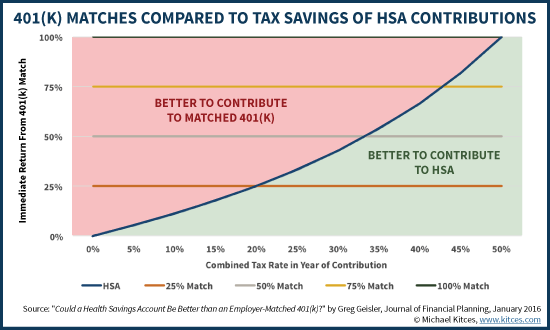
Again, as noted earlier, a head-to-head contribution to an HSA over a 401(k) plan with a match only wins in situations where there are not any medical expenses to pay out of pocket. In scenarios where there are, it’s better to get the “double” tax benefits of contributing to the 401(k) and using the HSA to pay medical expenses on a pre-tax basis as well. But where there won’t be any anticipated medical expenses, the HSA especially shines.
Which arguably means the starting point for anyone should be to contribute to the HSA first (if eligible), see if there are medical expenses later in the year (and whether they can or cannot be deducted if paid out of pocket), and then decide whether to contribute additionally to a 401(k) or IRA. Either way, the HSA would the starting point, and for limited dollars, might be the end point as well, given the inevitable combination of a health savings account and Medicare spending in the future! Though ultimately, the HSA is really the best savings account for retirement for those who can afford to contribute to retirement accounts, and an HSA, and have the cash flow or reserves to pay medical expenses out of pocket as well, to truly maximize the total dollars in tax-preferenced accounts! Presuming, of course, that the HSA dollars will be invested for growth in the long run, and not held in a cash or low-return holding account!
So what do you think? Do you ever counsel clients to contribute to an HSA before a retirement account? Would you consider doing so in the future?





It gets even better…
Pre-tax contributions to an HSA via your employer are not subject to OASDI withholding (in addition to being exempt from income tax)
If you make more than the OASDI limit plus the HSA max contribution limit then this has no effect.
We recommend this all the time for clients, especially those in the “already maxed out” all other retirement options. We even put clients’ HSA accounts into our investment portfolio allocation to clearly indicate this a retirement savings account.
Best “IRA” ever because it combines the tax-deductibility of a Traditional IRA with the tax-free compounding and tax-free earnings of a Roth IRA.
I have and I do per the reasons you’ve mentioned here. When a client and family both healthy I’ll max out the HSA first and then the 401k if there’s a match. Otherwise I’m always HSA FIRST. One of your best.
I read the original article and wasn’t sold on the idea. The author didn’t consider what the employee/investor has to give up, namely, a traditional healthcare plan with traditional montly payments and smaller deductibles. Let’s say the employee is considering maxing out the HSA at $6750 and has a family unit of five individuals, spouse and three children and the HSA deductible is $13100. You must earn $20,000 pretax to net $13,000 after tax (35%) to meet the family deductible for the HSA. Therefore, this strategy requires $26,750 to employ. $6,750 invested each year for 20 years at 9% grows to $345,000 tax free. The alternative is to go with a traditional group plan. Again, we have $26,750 to put to work. The group plan to cover the family is $600/mth and deductibles throughout the year require $1,500 more, for a total of $8,700 after-tax, and $13,384 pre-tax. $13,384 – $26,750 = $13,365 left to invest, $8,687 after-tax, if they don’t qualify for a tax deductible IRA. $8,687 invested at 9% per year for 20 years = $444,427 X 15% cap gains = $377,000 after-taxes. So I still need some more convincing data before to recommending to clients.
Another practical problem for those needing individual or family insurance (non-employer) is the very limited number of plans available. In Texas, almost all individual PPOs have been withdrawn leaving only HMOs with very narrow networks, some say undesirable networks eliminating leading physicians and hospitals, available in HSA qualified plans.
It is hard to find HDHPs on the ACA plans. Most are not called out conveniently in the descriptions (as I found when I was self-employed). And individual plan deductibles are much higher than employer-sponsored plan deductibles can be. So I agree, it needs research to figure out what works best in any individual situation. But while I am young and healthy, I have saved a lot of money with an HSA and an HDHP from my employer. Plus my employer contributes the first $500 into the HSA each year. That’s free money! I only wish I had known I could use the HSA to pay my premiums when I was collecting unemployment.
I have 2 questions: what happens if a non spouse inherits the HSA account and also what types of investments can the money be put in?
Spouse is the designated beneficiary. If your spouse is the designated beneficiary of your HSA, it will be treated as your spouse’s HSA after your death.
Spouse is not the designated beneficiary. If your spouse is not the designated beneficiary of your HSA:
The account stops being an HSA, and
The fair market value of the HSA becomes taxable to the beneficiary in the year in which you die.
I have been researching HSA administrators because my employer doesn’t have one. (I am enrolled in a qualified HDHP). Can you recommend a company or a good resource to help me determine which one offers a nice selection of low-cost index mutual funds (like Vanguard)?
One very important thing to note is that a lot of HSAs carry extra fees (that some IRAs don’t have) and can largely effect the value of your portfolio… I still haven’t found an administrator that I’m particularly happy with. Any guidance is greatly appreciated. Thank you!
https://www.hsasearch.com/compare/
An HSA can indeed be an excellent medical savings supplement for retirees, especially for basically healthy individuals unlikely to pay high deductibles and , as you note, ” have the cash flow or reserves to pay medical expenses out of pocket.” In those cases, they can build a nice nest egg to help pare down medical costs later.
But here’s the kicker: those out of pocket medical expenses in a HDHP can be shockingly elusive to predict (even a ball park figure) and suddenly the people enrolled in HDHPs are faced with thousands of extra dollars in unexpected costs (beyond the deductibles etc).
I’ve seen it time and again, especially when individuals have paid every cent of those high deductibles plus co-insurance requirements (as contrasted with co-pays) for their medical expenses and insurance companies are suddenly (supposed to be) on the hook for the lion’s share of the current and future medical bills.
That’s when they fight tooth and nail to deny claims and maximize profits. In a recent case where I saw all the paperwork etc…the insurance company sent a letter citing “state law” (vaguely and without specifics) and initially denied 4K of expenses -for a patient who fully followed accepted insurance protocol before gong to the ER. The denial was overturned after several appeals, written forms, and hours on the phone (all completed by the patient )
How many people even appeal those arbitrary denials? How many pay the high deductibles and then thousands more – on top of premiums, etc? Until I strongly urged him to appeal, the individual I know would have simply conceded the claim.
I wish I could say that was an isolated case.
I wish I had never bought the HSA. My wife had it when working, but she retired they started taking monthly fees. $3 a month ($36/year) to just have the HSA. We won’t use it for years because I have insurance on us with my employer. Money just down the drain.
This concerns me as I’ll be retiring soon, and I know my employer currently covers the $3/month fee that the HSA plan administrator charges each account to invest the funds (they don’t appear to charge a fee to let the funds sit uninvested). I had not considered that they might stop covering that fee when I stopped working there. Does anyone know if Allen D and others can transfer an HSA to another administrator that does not charge a fee, or charges a smaller fee?
Yes, both of you could open an HSA with any bank or brokerage firm that provides them to individuals, and either transfer or rollover funds to the new account. You can also reimburse yourself out of the HSA for any expenses incurred since the account was established. If your balance is not enough for investment earnings to outweigh fees, it’s probably worth using them tax free for qualified medical expenses.
IRS Pub 969 (was also linked in the article) will detail all of this too.
I am very disappointed in both this and the source article’s lack of details. To wit:
1) State taxation: besides CA, NJ and Al taxing both contributions and earnings, two states without personal income tax, but tax interest and dividends above certain amounts, tax earnings on HSAs: New Hampshire and Tennessee. No mention of this in either article.
2) No stretch ability for non-spouses. if the beneficiary is not a spouse, the account stops being an HSA, and the fair market value of the HSA becomes taxable to the beneficiary in the year in which the HSA owner dies.
It took me a few minutes to research these, there could others.
Over pushing HSAs without more critical analysis is similar to the pushing of LTCI withholding disclosing the fact premiums have and probably will go up in the future. It is disappointing to see such poor analysis getting mainstream media exposure.
You can remedy deep disappointment by appreciating extensive articles and accepting that complex topics aren’t covered comprehensively anywhere. It is partially what the comment section is for 😉
State taxation is a non-issue for someone who contributes the max to their tax-deferred options. Then, the federal tax benefits alone are always a good thing. A possible trade-off only occurs when someone needs to decide which tax-advantaged account(s) to contribute to.
The non-spousal beneficiary taxation is a non-issue if the non-spousal beneficiary is a charity. In my case, I plan on spending down my HSA during my lifetime. But I named a charity as contingent beneficiary… just in case I don’t spend everything on a walk-in tub, a Jazzy chair and blue pills.
Can you advise on this scenario: Early retiree married couple, ages 62 and 60. We have a high deductible plan and can contribute $7750 to an HSA. Our premiums for health and dental insurance for ourselves and 1 dependent child will total $17400. Our AGI is $100,000. This year we will have $9000 in out of pocket medical and dental expenses. I could afford to pay the out of pocket from other after tax savings. If I do, could I deduct $24150 from my income this year?
($7750 + $17400 + $9000) = $34150; (10% of $100000 AGI) = $10000
And just let the HSA money grow to cover future medical needs when we are on Medicare?
Most discussions re HSAs as saving vehicles rely on seeking years in the future reimbursement for the current year’s out of pocket. I figure in retirement I’ll have plenty of medical bills. I already know I’ll be needing hearing aids!
A tax professional will be best suited to address all the details, and taking some time to read over IRS Pub 969 will also help. What I do know is HSA contributions are automatically deductible against your federal income, so in this scenario your AGI would look more like $92,250 (or down to $91,250 if your spouse makes a catch up contribution to their own HSA). But you’re on the right path about the other part: you can choose to itemize medical expenses as a separate deduction while contributing to an HSA if you prefer not to withdraw from the HSA for those same expenses.
Looking down the road, there are other factors worth thinking about: when you choose to start Social Security, enrolling in Medicare at 65 or delaying if you can without penalty, how long you might claim your dependent, other deductions like IRAs and charitable donations, any pre-tax deductions from W-2 employment, etc. that could affect your strategy.
And when it comes time to buy hearing aids, they might be a lot less expensive when you are free to purchase them anywhere instead of using the distributors that insurance companies must purchase from. The IRS only cares what you purchase (I.e. That it is actually medical care or equipment, etc. for details see Pub 502) but they don’t care where in the world you buy it.
HSAs are the least understood and least well promoted vehicle for saving. I started mine in 2007 and it has grown considerably due to good health at a young age. However, the bet is that, as we age, we will need medical care before we reach retirement. I tell all my friends about it. I think one of the least understood factors is that, while you have a higher deductible, your insurance’s negotiated rates still apply, even when you have a higher deductible. In other words, a doctor bills your insurance for $3000 but the negotiated rate is still $1200, regardless of meeting the deductible. So it’s not as scary as it seems to be responsible for the first $3000 on a high deductible plan. Most younger people will benefit from saving the money they don’t spend, versus paying a higher premium for services they will not end up using. Thank you for this article!
Who is offering a growth investment account for HSA? I currently have one with my local bank and they only paid .10% . I am looking to use it for long term retirement account.
Thanks
jeff
I use HSA Bank which has an option to invest the HSA wtih TD Ameritrade. The HSA is integrated into my IPS and holds part of my equity allocation through Vangard ETFs. Total cost is $66/year.
http://www.hsabank.com/hsabank/members/td-ameritrade-hsa-investment-account
specialized question — suppose you are retired and for the moment not receiving any ordinary income (no work, no pension and just living on investment income) and your retiree medical plan is a high deductible plan. If you convert part of your regular IRA to a Roth IRA, you will generate ordinary income (at least that is how it is taxed). Could you make a HSA contribution and deduct the contribution against this ordinary income. It seems without ordinary income, you would be using an HSA contribution like a Roth contribution (no deduction but tax free accumulation of investment income)
It should work. The HSA deduction is pretty similar (if not equivalent) to taking an IRA deduction. Most people with only HDHP coverage should contribute to an HSA anyway, so it would seem like an opportune time to convert some pre-tax IRA assets to Roth at least to end up with a net $0 tax impact.
“For instance, if a contribution to a 401(k) offers a 25% match, but the individual faces a future tax rate of 20%, then $1 contributed to a 401(k) is still only worth $1 in after-tax value (as the match increases it to $1.25 but the taxes decrease it back to $1). Which is exactly the same as simply contributing the $1 of pre-tax income to an HSA, also worth $1 of after-tax value.”
What you didn’t consider is that the matched funds are free money! I don’t care if they are taxed at 50%, I’m still ahead. (50% of free money is still free money!) Huge mistake in the analysis!
An other benefit of HSAs is the asset protection benefit.